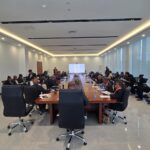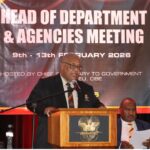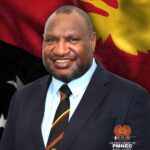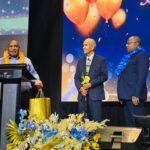Prime Minister Hon. James Marape has launched two major policy documents aimed at transforming the country’s marine and fisheries sectors, while reaffirming PNG’s commitment to regional fisheries cooperation and the fight against illegal fishing.
Speaking at the National Fisheries Authority (NFA) Gala Dinner, marking PNG’s 50th anniversary and the NFA’s 25th year, Mr. Marape unveiled the National Tuna Domestication Strategy and the National Agriculture Development Strategy 2025–2035, describing them as “roadmaps for economic independence.”
“Tonight, as we celebrate 50 years of nationhood and 25 years of the National Fisheries Authority, we also launch two important policy blueprints—the National Tuna Domestication Strategy and the National Agriculture Development Strategy 2025–2035—which will ensure that tuna caught in our waters and food produced on our land are processed here in Papua New Guinea to create jobs, add value, and build a resilient economy that leaves no child behind,” Prime Minister Marape said.
The Prime Minister emphasised that PNG’s vast ocean, fertile land, and numerous clean, fast-flowing rivers and streams must be harnessed responsibly for inland fisheries activities to achieve long-term prosperity.
He said last year’s record tuna processing volumes showed PNG’s potential and stressed that future catches must be processed locally rather than exported as raw products or other marine resources, such as prawns and crabs, to overseas markets for lower economic returns.
Prime Minister Marape also announced that Papua New Guinea is opening its doors for smaller Pacific Island nations to use PNG facilities to process their tuna under the East New Britain Initiative.
“Papua New Guinea stands with our Pacific family, and through the East New Britain Initiative we are providing land and facilities for our smaller island neighbours to process their tuna catch in our country.
“Whether it carries the label of Nauru, Kiribati, or the Federated States of Micronesia, the Pacific tuna brand stays in the Pacific, bringing value to our people while we collectively confront the challenges of climate change together,” he said.
Marape reminded Pacific leaders, NFA senior officials, management, and those involved in the fisheries sector that the Pacific Ocean is the world’s largest tuna resource and must be the foundation of the region’s economic strength, likening its importance to oil in the Middle East.
The East New Britain Initiative (ENBi) was launched in September 2023 during the 23rd Special Forum Fisheries Agency (FFA) Committee meeting in Papua New Guinea. Its main goal is to boost the economic benefits of tuna fisheries for Pacific Island countries by processing tuna locally instead of exporting it raw.
The initiative focuses on building regional processing centres, known as hubs, along with smaller satellite facilities called spokes, and implementing value-addition strategies, such as producing canned, smoked, or dried tuna. This approach aims to create more jobs, increase income, and strengthen the region’s fishing industry.
ENBi also encourages collaboration among member countries to overcome challenges such as high costs, limited infrastructure, and access to markets. With sup- port from organizations like the European Union and the FFA, the initiative works to make tuna fisheries more sustainable and profitable. By processing tuna within the region and adding value to the products, ENBi aims to improve food security, create long-term economic benefits, and strengthen the Pacific Islands’ position in the global tuna market.
On the issue of illegal fishing, Prime Minister Marape declared a strong stance, vowing to strengthen surveillance and cooperation with regional partners to ensure fair returns for Pacific nations.
“Enough is enough. Our fish cannot continue to be plundered illegally while our people receive only crumbs. Papua New Guinea is strengthening monitoring and working closely with our Pacific neighbours to stop illegal fishing so that our oceans remain clean, our resources are harvested fairly, and Pacific nations gain the wealth that rightfully belongs to us,” Mr. Marape said.
The Prime Minister concluded by reaffirming PNG’s commitment to building a K200 billion economy by 2030, driven by agriculture, fisheries, and sustainable resource management. He said that while countries like Korea can be leaders in technology, America can remain a global superpower, and innovators like Elon Musk can send humans to the moon, Papua New Guinea must use its land and natural fisheries resources to produce food and feed those countries and other people around the world.






